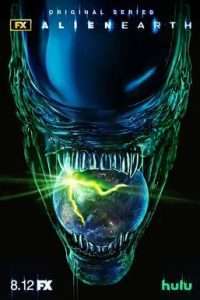REVIEW: Alien: Earth
Alien: Earth and creator, Noah Hawley, has succeeded in offering us a strong installment that continues the Alien legacy, while also bringing something new to the table. It embraces the slightly more philosophical side of the franchise and doesn’t skimp on the limb-flying, bloody action, or the ominous tension either.
 Homage is most obviously paid with the Maginot and crew – the interior of the ship is nearly identical to the Nostromo, the crew are similar in their bickering, even down to the ship’s cat. That cat is an indicator, early in the series, of Hawley & co’s intentions for Alien: Earth. No one is safe.
Homage is most obviously paid with the Maginot and crew – the interior of the ship is nearly identical to the Nostromo, the crew are similar in their bickering, even down to the ship’s cat. That cat is an indicator, early in the series, of Hawley & co’s intentions for Alien: Earth. No one is safe.
Although Weyland-Yutani have sent the Maginot out to collect ‘specimens’ – including a familiar clutch of large, leathery eggs – most of Alien: Earth approaches events from the perspective of rival company Prodigy, headed up by imminently hateable Boy Kavalier (Samuel Blenkin). In this dystopian future of mega-corporations controlling, and governing, different swathes of countries, there is a never-ending struggle to one-up each other. Kavalier’s next big breakthrough is planned to be hybrids: human consciousness transferred into a synthetic body, in an attempt at immortality.
We are introduced to his ‘Lost Boys’, who are a group of terminally ill children who are the first to have their minds transferred into synthetic bodies. All the children are renamed after characters from Peter Pan – Wendy, Smee, Slightly, Nibs, Curly, and Tootles – seemingly for camaraderie, although more realistically to hide their identities from the wider world. Wendy (Sydney Chandler) is the first transferee and becomes the de facto leader of the group of children with supercomputer brains and preternaturally strong bodies.
With the slight headstart she has, Wendy begins developing skills afforded to her by this new body and piques Boy Kavalier’s interests to see how far she can be pushed. Into this setup, crashes the Maginot, straight into the middle of Prodigy territory. Keen to secure the specimens on board and gain another edge over the competition, the Lost Boys and their synthetic ‘handler’ Kirsch (Timothy Oliphant) are hurtled into the chaos.
Aboard the Maginot, only one man has survived the crash – Morrow (Babou Ceesay) – a cyborg with an enhanced arm that sports a vicious blade that emerges through the middle of his fist, courtesy of Weyland-Yutani. Morrow is tasked directly by Ms. Yutani to keep the ship and cargo contained, which is easier said than done when it transpires several of the predatory lifeforms on board are loose.
This is the broad set-up for Alien: Earth, and the first half of the series will hook and draw you in with the action and horror that’s associated with the Alien universe. It’s tense, violent and keeps viewers on the edge of their seat. Within that melange are little gems of insight that hint at the grander hopes of the series.
There’s a lot of cyborg theory dropped into Alien: Earth, which focuses on the artificial boundaries between human and non-human animals, and then human-animals and cyborgs. As the children grapple with their identities, they’re pushed in different directions by the adults around them, only now they have the capability to push back. Morrow asks, “When is a machine not a machine?” when he encounters Slightly and Smee on the Maginot, and this too hints at the wider philosophical questions the series is trying to posit.
Alien: Earth is at its core a story of two halves. On the one side we have the classic aggressive, predatory alien lifeforms that humans are trying to profit from and hoping they don’t get loose (oh, the hubris!). On the other side, it’s trying to needle into that situation and ask how we got there in the first place. The Lost Boys bring a child’s innocent view of the world – of right and wrong – that would usually have been destroyed by the time they grew up enough to effect any real change. With their grown-up-plus bodies, however, they can dig their heels in and confront the mechanisms around them to challenge the status quo.
Alien: Earth pulls on the central themes of the original films, and even seems to veer into some of the non-film novels, to bring us a comprehensive new chapter in the franchise. There’s action, scares, tension and content to make you interrogate where we’re heading as a species. There are a few little inconsistencies here and there but the performance of the cast more than makes up for it. It is certainly up there as one of the better entries in the universe, and even as a standalone piece of TV it is greatly entertaining. With a franchise as long-standing and varied as Alien, there will be some people who don’t enjoy it, sure, but I thoroughly enjoyed it and plan to start a rewatch ASAP.
The post REVIEW: Alien: Earth appeared first on Grimdark Magazine.



